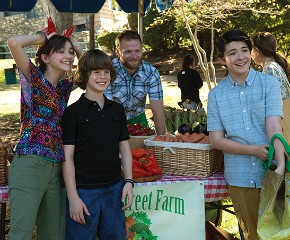Magic on Normal Street

Amazon’s original series, Gortimer Gibbon’s Life on Normal Street, follows the title character and his best friends through the tribulations of growing up. On the one hand, Normal Street is an ordinary, even boring place to live. On the other hand, it’s a place where extraordinary events break in. The show uses a combination of magic and realism that depicts real life far better than any other family television show I’ve seen.
Gortimer (Sloane Morgan Siegel) lives with his mom and younger brother. His core trio of friends includes goofy, enthusiastic Ranger (Drew Justice) and dreamy, brilliant Mel (Ashley Boettcher). The fresh, unaffected performances of all three young actors conjure up that time when children are ineluctably but mysteriously transforming into adults.
Read our latest issue or browse back issues.
Each episode contains a focal point, a piece of heightened reality that manages to tell the truth about the hard, ordinary work of growing up. In one episode, for example, the kids create a permanent rainbow that represents permanent happiness. Soon, however, the friends realize that the unrelenting happiness is eerie and uncomfortable.
Gortimer’s father visits while the rainbow is visible (his parents are divorced). Gortimer struggles with the infrequency of his father’s visits; his father’s work keeps him away from his sons. In the rainbow episode, he comes to visit but soon has to leave, and when he does the rainbow fades. Gortimer’s dad explains that he has to go because “guys like you and me, we help people who need help. That is who we are.” It’s a powerful statement, but Gortimer is left with unresolved sadness.
In another episode, Ranger, who loves basketball but seldom gets to play, becomes a living good-luck charm for his basketball team. He’s taken in by the quasi-acceptance he gets from the players—even when it puts him in real danger.
In another episode, Mel uses software to take blemishes out of school yearbook photos and “fix” Gortimer’s smile. When the magical fixes have disconcerting repercussions in real life, she races against time to undo the photo edits.
The magical metaphors lead the viewer to reflect on the relationship between the ideal and the real in the children’s lives. When Mel, Gortimer, and Ranger are wrestling with the anxiety of starting high school, they make a wish on a star—and wish to be together in one endless, perfect moment. Their wish comes true, and they live for weeks watching meteor showers, eating from a bottomless bag of marshmallows, and creating mega-s’mores. Life together is wonderful at first, but eventually the friends confront their fears, undo the wish, and move into their futures.
If you compare Gortimer to Jessie, a more typical television show aimed at a tween audience, you can better appreciate the superrealism of Normal Street. In Disney’s Jessie, a small-town girl becomes a nanny to four extremely wealthy children and one gigantic pet lizard. The movie lacks the charm and grittiness of Gortimer and glosses over messy realities: the realities of adoption and race that the multiethnic family would have to address and the lack of parenting offered by the wealthy mom and dad. Instead, it trades on cheap stereotypes. Its airbrushed characters can’t compete with the vulnerable charm of Gortimer’s characters or the unflinching way the show deals with coming of age, community, and death.
Supernatural is not the same thing as magical, but the magic in Gortimer does tap into our longings for a deeper reality. By giving children the ability to put their desires into magical form, the show moves beyond entertainment toward enchantment.






